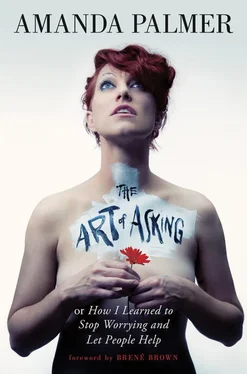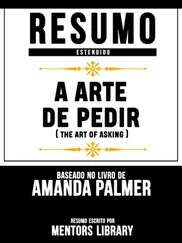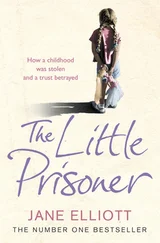Every single one of these jobs taught me about human vulnerability.
Mostly, I learned a lot about asking.
Almost every important human encounter boils down to the act, and the art, of asking.
Asking is , in itself, the fundamental building block of any relationship. Constantly and usually indirectly, often wordlessly, we ask each other—our bosses, our spouses, our friends, our employees—in order to build and maintain our relationships with one another.
Will you help me?
Can I trust you?
Are you going to screw me over?
Are you suuuure I can trust you?
And so often, underneath it all, these questions originate in our basic, human longing to know:
Do you love me?
• • •
In 2012, I was invited to give a talk at the TED conference, which was daunting; I’m not a professional speaker. Having battled my way—very publicly—out of my major-label recording contract a few years earlier, I had decided that I’d look to my fans to make my next album through Kickstarter, a crowdfunding platform that had recently opened up the doors for thousands of other creators to finance their work with the direct backing of their supporters. My Kickstarter backers had spent a collective $1.2 million to preorder and pay for my latest full-band album, Theatre Is Evil , making it the biggest music project in crowdfunding history.
Crowdfunding, for the uninitiated, is a way to raise money for ventures (creative, tech, personal, and otherwise) by asking individuals (the Crowd) to contribute to one large online pool of capital (the Funding). Sites like Kickstarter, Indiegogo, and GoFundMe have cropped up all over the world to ease the transaction between those asking for help and those answering that call, and to make that transaction as practical as possible.
Like any new transactional tool, though, it’s gotten complicated. It’s become an online Wild West as artists and creators of all stripes try to navigate the weird new waters of exchanging money for art. The very existence of crowdfunding has presented us all with a deeper set of underlying questions:
How do we ask each other for help?
When can we ask?
Who’s allowed to ask?
My Kickstarter was dramatically successful: my backers—almost twenty-five thousand of them—had been following my personal story for years. They were thrilled to be able to aid and abet my independence from a label. However, besides the breathless calls from reporters who’d never heard of me (not surprising since I’d never had an inch of ink in Rolling Stone ) asking about why all these people helped me, I was surprised by some of the negative reactions to its success. As I launched my campaign, I walked right into a wider cultural debate that was already raging about whether crowdfunding should be allowed at all; some critics were dismissing it out of hand as a crass form of “digital panhandling.”
Apparently, it was distasteful to ask. I was targeted as the worst offender for a lot of reasons: because I’d already been promoted by a major label, because I had a famous husband, because I was a flaming narcissist.
Things went from dark to darker in the months after my Kickstarter as I set off to tour the world with my band and put out my usual call to local volunteer musicians who might want to join us onstage for a few songs. We were a tight community, and I’d been doing things like that for years. I was lambasted in the press.
My crowdfunding success, plus the attention it drew, led TED to invite me, a relatively unknown indie rock musician, to talk for twelve minutes on a stage usually reserved for top scientists, inventors, and educators. Trying to figure out exactly what to say and how to say it was—to put it mildly—scary as shit.
I considered writing a twelve-minute performance-art opera, featuring ukulele and piano, dramatizing my entire life from The Womb to The Kickstarter. Fortunately, I decided against that and opted for a straightforward explanation of my experience as a street performer, my crowdfunding success and the ensuing backlash, and how I saw an undeniable connection between the two.
As I was writing it, I aimed my TED talk at a narrow slice of my social circle: my awkward, embarrassed musician friends. Crowdfunding was getting many of them excited but anxious. I’d been helping a lot of friends out with their own Kickstarter campaigns, and chatting with them about their experiences at local bars, at parties, in backstage dressing rooms before shows. I wanted to address a fundamental topic that had been troubling me: To tell my artist friends that it was okay to ask. It was okay to ask for money, and it was okay to ask for help.
Lots of my friends had already successfully used crowdfunding to make new works possible: albums, film projects, newfangled instruments, art-party barges made of recycled garbage—things that never would have existed without this new way of sharing and exchanging energy. But many of them were also struggling with it. I’d been watching.
Each online crowdfunding pitch features a video in which the creator explains their mission and delivers their appeal. I found myself cringing at the parade of crowdfunding videos in which my friends looked (or avoided looking) into the camera, stammering, Okay, heh heh, it’s AWKWARD TIME! Hi, everybody, um, here we go. Oh my god. We are so, so sorry to be asking, this is so embarrassing, but… please help us fund our album, because…
I wanted to tell my friends it was not only unnecessary to act shame-ridden and apologetic, it was counterproductive .
I wanted to tell them that in truth, many people enthusiastically loved helping artists. That this wasn’t a one-sided game. That working artists and their supportive audiences are two necessary parts in a complex ecosystem. That shame pollutes an environment of asking and giving that thrives on trust and openness. I was hoping I could give them some sort of cosmic, universal permission to stop over-apologizing, stop fretting, stop justifying, and for god’s sake… just ASK.
• • •
I prepared for more than a month, pacing in the basement of a rented house and running my TED talk script past dozens of friends and family members, trying to condense everything I had to say into twelve minutes. Then I flew to Long Beach, California, took a deep breath, delivered the talk, and received a standing ovation. A few minutes after I got off the stage, a woman came up to me in the lobby of the conference center and introduced herself.
I was still in a daze. The talk had taken so much brain space to deliver, and I finally had my head back to myself.
I’m the speaker coach here , she began.
I froze. My talk was supposed to have been exactly twelve minutes. I’d paused a few times, and lost my place, and I’d gone well over thirteen. Oh shit , I thought. TED is going to fire me . I mean, they couldn’t really fire me. The deed was done. But still. I shook her hand.
Hi! I’m really, really sorry I went so over the time limit. Really sorry. I got totally thrown. Was it okay, though? Did I TED well? Am I fired?
No, silly, you’re not fired. Not at all. Your talk… And she couldn’t go on. Her eyes welled up.
I stood there, baffled. Why was the TED speaker coach looking as if she was going to cry at me?
Your talk made me realize something I’ve been battling with for years. I’m also an artist, a playwright. I have so many people willing to help me, and all I have to do is… but I can’t… I haven’t been able to…
Читать дальше












